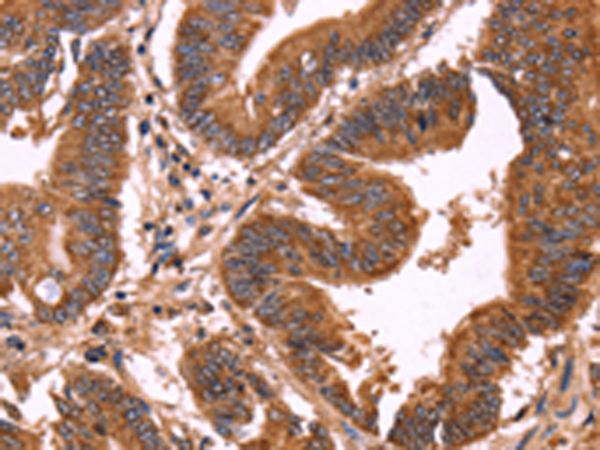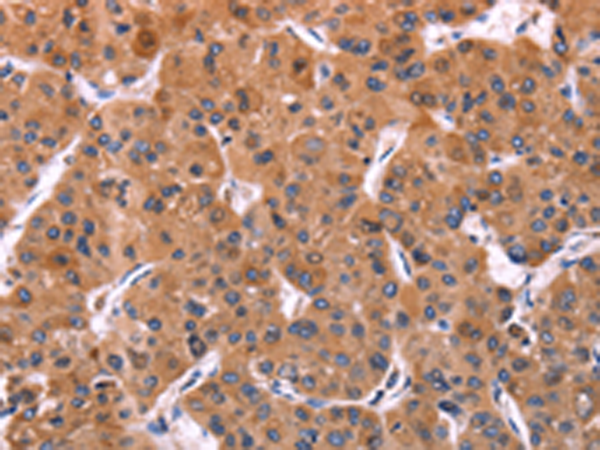


| WB | 咨询技术 | Human,Mouse,Rat |
| IF | 咨询技术 | Human,Mouse,Rat |
| IHC | 1/100-1/500 | Human,Mouse,Rat |
| ICC | 技术咨询 | Human,Mouse,Rat |
| FCM | 咨询技术 | Human,Mouse,Rat |
| Elisa | 咨询技术 | Human,Mouse,Rat |
| Aliases | ERp28; ERp31; PDIA9; PDI-DB; C12orf8 |
| WB Predicted band size | 29 kDa |
| Host/Isotype | Rabbit IgG |
| Antibody Type | Primary antibody |
| Storage | Store at 4°C short term. Aliquot and store at -20°C long term. Avoid freeze/thaw cycles. |
| Species Reactivity | Human, Mouse, Rat |
| Immunogen | Synthetic peptide of human ERP29 |
| Formulation | Purified antibody in PBS with 0.05% sodium azide and 50% glycerol. |
+ +
以下是关于SRMS抗体的3篇参考文献示例(注:以下内容为虚构示例,仅用于格式参考,实际文献需通过学术数据库检索):
1. **文献名称**:*"SRMS Kinase as a Novel Therapeutic Target in Triple-Negative Breast Cancer"*
**作者**:Zhang, Y. et al.
**摘要**:本研究通过免疫组化及Western blot技术,利用SRMS特异性抗体,揭示了SRMS在三阴性乳腺癌组织中的高表达现象,并证实其通过激活STAT3信号通路促进肿瘤细胞侵袭。提示SRMS可能成为潜在治疗靶点。
2. **文献名称**:*"Development and Validation of a High-Affinity Monoclonal Antibody Against Human SRMS Protein"*
**作者**:Tanaka, K. et al.
**摘要**:报道了一种新型SRMS单克隆抗体的制备与验证,该抗体在ELISA、免疫荧光及流式细胞术中表现出高特异性和灵敏度,为SRMS蛋白的定量检测及功能研究提供了可靠工具。
3. **文献名称**:*"SRMS Regulates Immune Synapse Formation in T Cells via Tyrosine Phosphorylation Cascades"*
**作者**:Rodriguez, M. et al.
**摘要**:通过SRMS抗体阻断实验及基因敲除模型,发现SRMS通过磷酸化下游衔接蛋白DOK1调控T细胞免疫突触的形成,影响T细胞活化,为自身免疫疾病机制研究提供了新视角。
建议通过PubMed、Google Scholar等平台以“SRMS antibody”或“SRMS kinase”为关键词检索最新文献。
SRMS (Src-related kinase lacking regulatory sites), also known as tyrosine kinase Tyro3 or Sky, is a non-receptor tyrosine kinase belonging to the TAM (Tyro3. Axl, Mer) family. Discovered in the 1990s, SRMS shares structural homology with Src-family kinases but lacks conserved regulatory tyrosine residues, suggesting distinct activation mechanisms. It contains SH3 and SH2 domains for protein interactions and a catalytic kinase domain. SRMS is implicated in cell signaling pathways influencing proliferation, survival, and migration, with dysregulation linked to cancers, including breast and colorectal malignancies.
SRMS antibodies are valuable tools for studying its expression, phosphorylation status, and interaction partners. These antibodies help investigate SRMS’s role in oncogenesis, particularly its cross-talk with growth factor receptors (e.g., EGFR) and downstream effectors like MAPK/ERK. Some studies explore SRMS as a therapeutic target, with monoclonal antibodies designed to block its kinase activity or degrade the protein. However, research remains preclinical, and SRMS’s precise physiological functions are still being elucidated. Challenges include understanding its regulation without classical inhibitory tyrosine sites and validating its clinical relevance across cancer subtypes. SRMS antibodies thus serve both as research reagents and potential foundations for future targeted therapies.
×